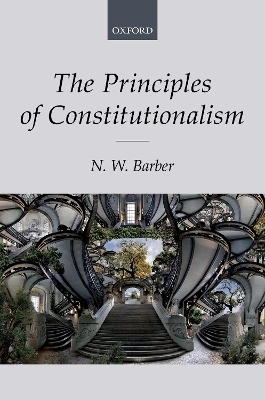
The Principles of Constitutionalism
Oxford University Press (Verlag)
978-0-19-880814-5 (ISBN)
In this follow-up volume to the critically acclaimed The Constitutional State, N. W. Barber explores how the principles of constitutionalism structure and influence successful states.
Constitutionalism is not exclusively a mechanism to limit state powers. An attractive and satisfying account of constitutionalism, and, by derivation, of the state, can only be reached if the principles of constitutionalism are seen as interlocking parts of a broader doctrine. This holistic study of the relationship between the constitutional state and its central principles - sovereignty; the separation of powers; the rule of law; subsidiarity; democracy; and civil society - casts light on long-standing debates over the meaning and implications of constitutionalism.
The book provides a concise introduction to constitutionalism and a detailed account of the nature and implications of each of the principles in question. It concludes with an examination of the importance of constitutional principles to the work of judges, legislators, and others involved in the operation and creation of the constitution. The book is essential reading for those seeking a definitive account of constitutionalism and its benefits.
N. W. Barber joined the Oxford Law Faculty in 1998, and has been a fellow of Trinity College since 2000. In 2013 he was appointed University Lecturer in Constitutional Law and in 2017 he was appointed Professor of Constitutional Law and Theory. He holds an MA and BCL from Oxford, and is a non-practising barrister and member of Middle Temple. He has lectured extensively on constitutional law and theory in many countries. He has published many papers in these areas, and his book, The Constitutional State (OUP, 2011) was widely reviewed.
1: Introduction: Constitutionalism
Negative Constitutionalism
Positive Constitutionalism
Constitutionalism: A Fresh Start
2: Sovereignty
The Four Aspects of Sovereignty
The Value of Sovereignty
Is the Creation of the State Always Desirable?
A Note on the Supposed Passing of State Sovereignty
3: The Separation of Powers
The Point of the Separation of Powers
Approaching the Separation of Powers
Relationships Between Institutions
The Demands of the Separation of Powers
4: The Rule of Law
The Demands of the Rule of Law
The Rule of Law and the State
5: Civil Society
States and Private Groups
Civil Society and the Invisible Hand
6: Democracy
Direct Democracy
Representative Democracy
The Indispensability of Political Parties
7: Subsidiarity
The Demands of Subsidiarity
The Application of Subsidiarity
Subsidiarity and National Self-Determination
8: Conclusion: The Application of the Principles of Constitutionalism
The Interconnectedness of the Principles of Constitutionalism
Justified Variation in the Application of the Principles
Justifiable Departure from the Principles of Constitutionalism
Appendix: Invisible Hand Systems
The Market as an Instance of the Invisible Hand
Invisible Hand Systems Contrasted with Direct Co-Ordination Through Authority
| Erscheinungsdatum | 28.08.2018 |
|---|---|
| Verlagsort | Oxford |
| Sprache | englisch |
| Maße | 163 x 242 mm |
| Gewicht | 604 g |
| Themenwelt | Recht / Steuern ► Allgemeines / Lexika |
| Recht / Steuern ► EU / Internationales Recht | |
| Recht / Steuern ► Öffentliches Recht ► Verfassungsrecht | |
| Recht / Steuern ► Privatrecht / Bürgerliches Recht | |
| ISBN-10 | 0-19-880814-3 / 0198808143 |
| ISBN-13 | 978-0-19-880814-5 / 9780198808145 |
| Zustand | Neuware |
| Haben Sie eine Frage zum Produkt? |
aus dem Bereich


